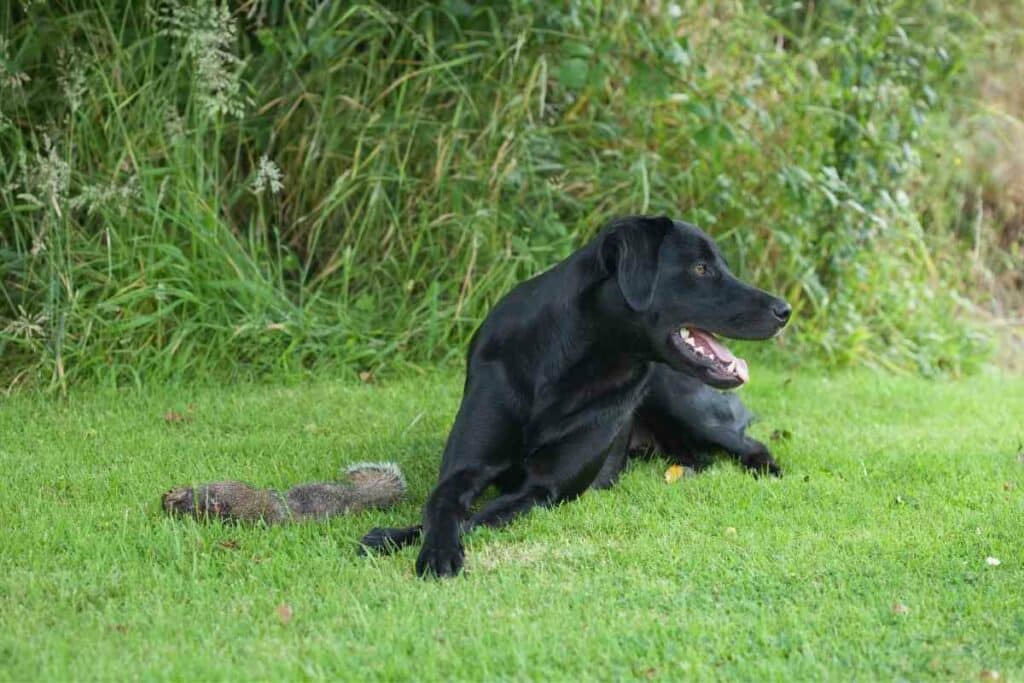Squirrels are adorable and lovable creatures that we humans adore and love to watch, but finding one still on the ground isn’t much fun.
In order to prevent these deaths, you should know the 5 common causes of squirrel deaths.
When it comes to squirrel death, these five causes stand out as the most common: disease, poisons, predation, falls, and cars.
Some of these you have a hand in preventing, but some of them are completely out of your control.
1.Diseases and Infections
Diseases and infections are responsible for the deaths of many squirrels each year.
Animal Distemper Virus
One of the most common causes of squirrel death is an infection with a virus called animal distemper virus. This disease has been thought to wipe out entire colonies of gray squirrels in America.
Animal distemper virus doesn’t have a cure, and it can cause gastrointestinal, neurologic, and respiratory illness.
Bartonella
Bartonella is an infection that’s carried by fleas, lice, and ticks. It’s normally found in cats and is often referred to as cat-scratch disease.
a bacterial infection known as cat scratch disease (on account of infected cats often passing it to their owners), carried through ticks, fleas, and lice. Typical symptoms are inflammation of the eyes, mouth, and gums, sneezing, fever, and chronic vomiting and diarrhea.
Rabies
Rabies is a serious, fatal disease caused by a virus that attacks the central nervous system. The virus is usually spread through the saliva of an infected animal, such as a dog, cat, raccoon, or squirrel.
Signs and symptoms of rabies can include fever, headache, fatigue, and general malaise. As the disease progresses, more severe signs and symptoms can develop, including paralysis, convulsions, and difficulty breathing.
Rabies is almost always fatal once symptoms develop.
There is no cure for rabies, but it can be prevented through immunization. If you think you may have been exposed to rabies, seek medical attention immediately.
Squirrel Pox Virus
Squirrel pox is transmitted through bites from infected animals, mosquitos, and fleas, and can cause blindness, neurological damage, and death in squirrels.
It also attacks the skin cells of squirrels and causes large lumps to develop on the squirrel’s body or face that eventually burst open and release fluids which then crust over creating a thick scab.
If squirrel pox spreads to the squirrel’s brain it can be fatal.
Toxoplasmosis
Toxoplasmosis is a neurological disease that is often fatal for a squirrel to contract. Bacteria from an infected cat’s feces will infect the squirrel if they come into contact with it, usually through water or food contaminated by infected feces.
2. Poisons
There are many different types of poisons that can kill a squirrel depending upon the way the poison is administered and what kind of poison it is.
1. Anticoagulant rodenticides (ARs) – ARs cause blood to clot within the squirrel’s body which can lead to internal bleeding and death if not treated immediately using Vitamin K1.
2. Cholecalciferol poisons (vitamin D3 and rodenticides) – Vitamin D and its derivatives build up in the squirrel’s body and damage the kidneys, heart, and lungs.
3. Heavy metal poisons – Causes immediate death after ingestion or prolonged exposure causes impaired liver function followed by liver damage and death.
4. Chemical poisons – Affect multiple organs within a short period of time and may cause death within a few hours or a few days.
5. Nutritional poisons – Nutritional poisons are part of complete and balanced diets for rodents that contain harmful levels of zinc phosphide, strychnine salts, and anticoagulant agents.
6. Insecticides – If ingested or absorbed through the skin, insecticides can cause tremors, seizures, and death.
7. Rodenticides – Causes internal bleeding if ingested; convulsions if swallowed; diarrhea or vomiting that causes dehydration (may take up to two weeks), then death due to shock or organ failure if not treated with Vitamin K1.
8. Metaldehyde – A chemical compound found in slug and snail baits, metaldehyde causes seizures as a result of asphyxiation as the squirrel struggles to breathe.
9. Zinc phosphate – Ingestion causes a loss of appetite, weight loss, abdominal pain, and vomiting; followed by kidney failure and death.
3.Predation
Squirrels are prey, and many animals are looking to make it their next meal.
Pets
Dogs and cats are both natural predators. They’ll chase squirrels until they can catch them, and if a squirrel doesn’t get away in time, your pet will fast food… a quick meal…
Animals

It’s not just your animals, but wild animals too. Squirrels need to protect themselves from coyotes, raccoons, weasels, badgers, bobcats, and just about anything else that’s bigger or faster than a squirrel.
Squirrels normally climb trees to get away from dogs and cats, but some of these wild animals climb trees too, so squirrels have to be careful everywhere they go.
Birds
As if having this many predators on the ground wasn’t bad enough, squirrels also have to be careful of what’s flying above them. Eagles, hawks, falcons, and owls all prey on squirrels too.
4. Falling
Squirrels love to climb trees and buildings. Their tail and bodies are designed to be better at falling, and surviving falls, but there are times things don’t go as planned.
If a squirrel can’t get in the right position before they hit the ground, or if they have an injury prior to falling, the landing can be fatal.
5. Vehicles
Vehicles are one of the most common causes of death for squirrels in more ways than one.
There’s the obvious roadkill. Squirrels are fast and they don’t understand traffic laws. This means at any second a squirrel can dart in front of a car, which doesn’t give the driver any time to stop safely to avoid the squirrel.
Squirrels can also hide under the hood or in your wheel wells. If you start your vehicle without checking, you could accidentally kill a squirrel.
How to Prevent Squirrel Deaths
The best way to prevent squirrel deaths is not to use poisons or insecticides in your backyard. If you are noticing an increase in squirrel deaths in your area, but you aren’t using poisons or insecticides, talk to your neighbors.
You can also prevent squirrel deaths by keeping your pets inside and away from them. If you need to let your dog out for a bathroom break, check to see if there are any squirrels on the ground your dog could get to.
If there are, try to scare them away before letting your dog out.
Keep your eyes open in and around your vehicle. There will be times you can’t avoid hitting a squirrel on the road safely.

The road conditions could be poor, or there’s traffic and you can’t swerve or slam on your brakes, but by checking upcoming stretches of road, you might be able to spare a life.
You should also check your car before starting it.
Small animals like squirrels will usually only hide in your car during cold winter months, so if you see pawprints in the snow around your car, check to see if the squirrel has vacated before you drive off.
What To Do With a Dead Squirrel?
If you find a dead squirrel on the side of the road, leave it. There are natural “garbage removal” services in the wild, and in just a few hours, or maybe even a couple of days, birds and other animals will have cleaned up the mess.
Finding a dead squirrel in your backyard is a different story. Not only do you not want to attract more animals, but having a dead squirrel isn’t safe for kids to play with.
Here are the steps you can take to remove a dead squirrel safely:
- Check with your state’s Department of Environmental Protection or Department of Environmental Conservation. They may want to collect the animal to test it, or they may tell you to dispose of it.
- If you’re given the go-ahead to dispose of it, grab a pair of gloves, a shovel, and a garbage bag.
- Put the gloves on, and use a shovel to pick up the dead squirrel and put it in the garbage bag. Tie the garbage bag, remove your gloves, and put them with the rest of your garbage.
- Wash. Your. Hands. This step is important! You could get sick from handling dead animals, and washing your hands, even if you wore gloves, will protect you from contracting any diseases or illnesses from the dead squirrel.
Final Thoughts
There are the five most common causes of squirrel death and what to do if you find a dead squirrel in your yard. Hopefully, this information will help you keep these backyard friends safe and healthy.
If you happen to find a dead squirrel in your backyard, don’t forget to call your local DEP or DEC office before throwing the poor guy in the garbage can!
